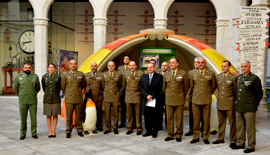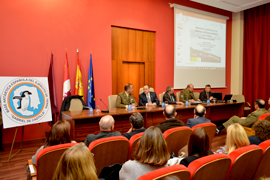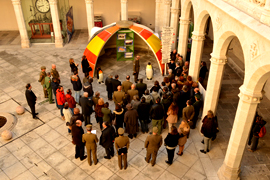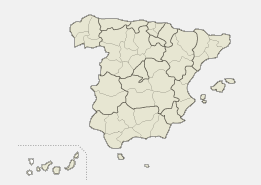- Home
- Latest News
- La Universidad de Valladolid acogió la presentación de la aportación del Ejército de Tierra a la Campaña Antártica española 2017-2018
The University of Valladolid took in the presentation of the Spanish Army's contribution to the Antarctic Spanish Campaing 2017-2018
Thursday, November 30, 2017
Number: 6376
This mission is an example of collaboration between scientists and soldiers

Antarctic Spanish Campaing's members together with Valladolid University's rector and the technical secretary of the Division of Operations. (Photo G.Herrador)

Campaing's presentation. (Photo G.Herrador)

Presentation of the exhibition of photos and elements of the Antarctic Campaing. (Photo G.Herrador)
Tuesday the 28th of November, at 11:30am, in Salón de Grados of the Faculty of Law, at the University of Valladolid (UVa), there was an official presentation of the Spanish Army's participation in the Antarctic Campaing 2017-2018, the oldest mission developed abroad with this 31st edition.
The act has been chaired by Daniel Miguel San José, rector of the university, who was accompanied by Colonel Juan José Castellanos, technical secretary of the Divison of Operations of the Spanish Army, Andrés Barbosa, manager of the National Programme of Polar Investigation, Ángel de Frutos, professor of the Science Faculty at UVa, and Major Valentín C. Benéitez, Chief of the Antarctic Spanish Base (BAE) "Gabriel de Castilla", managed by the Spanish Army. Activities conducted by Spain in the Antarctic have been exposed, concretely, tasks which are anticipated to be developed in the present edition of the BAE.
When the presentation finished, they visited, in the cloister of Santa Cruz Palace, rectorship's seat of the University of Valladolid, the exhibition of photos and elements belonging to the Antarctic Campaing of the Spanish Army, that will be there until the 9th of December.
The Antarctic Spanish Campaing:
The Antarctic Spanish Campaing constitutes a model of cooperation among different public and private institutions under the service of the I+D+i inside of the frame of the State Plan of Scientific and Technical Investigation and Innovation.
The Treasury, Industry and Competitiveness Departament finances the projetcs that are conducted in both, at Antarctic bases and on board of the Hespérides ship - through a subprogramme of Polar Investigation of the State's Agency of Investigation - and the logistic of the campaing. Furthermore, throught the Polar Committee, it coordinates the activities that the different organisms develop during the campaings.
The attending entities in these activities are the Unit of Navy Technology of the Spanish National Research Council (CSIC in Spanish), which is managed at BAE Juan Carlos I in Livingston Island and that coordinates the general logistic of the Antarctic Campaing; the Spanish Army, which manages BAE Gabriel de Castilla in Decepción Island and, the Navy, that works in BIO Hespérides.
BIO Hespérides and Antarctic bases as well, form part of the Spanish map of Scientific and Singular Techniques Infrastructures (ICTS in Spanish), installations, resources or exceptional services in its type, whose importance and strategic character justifies the availability for all the I+D+i collective.
Participants of the 31st Campaing:
This campaing will receive 16 projects of investigation finances by the Statal Agency of Investigation, that will develop the following entities: Andalusian Institute of Land Sciences (CSIC); Geological and Mining Institute of Spain (IGME in Spanish), Ramón Llull University, University of Alcalá de Henares, Technical University of Madrid, Autonomous University of Madrid, Envaironmental Diagnostic and Water Studies Institute (CSIC), National Museum of Natural Sciences (CSIC), Complutense University of Madrid, University of Oviedo, Land Sciences Institute Jaume Almera (CSIC), University of Granada, University of Barcelona, Astrobiology Centre (INTA-CSIC ) and Navy's Hydrographic Institute.
ARMY UNITS
- Araba Álava |
- Albacete |
- Alicante |
- Almería |
- Asturias |
- Ávila |
- Badajoz |
- Barcelona |
- Burgos |
- Cáceres |
- Cádiz |
- Cantabria |
- Castellón |
- Ceuta |
- Ciudad Real |
- Córdoba |
- A Coruña |
- Cuenca |
- Girona |
- Granada |
- Guadalajara |
- Gipuzkoa |
- Huelva |
- Huesca |
- Islas Baleares |
- Jaén |
- León |
- Lleida |
- Lugo |
- Madrid |
- Málaga |
- Melilla |
- Murcia |
- Navarra |
- Ourense |
- Palencia |
- Las Palmas |
- Pontevedra |
- La Rioja |
- Salamanca |
- Segovia |
- Sevilla |
- Soria |
- Tarragona |
- Santa Cruz de Tenerife |
- Teruel |
- Toledo |
- Valencia |
- Valladolid |
- Bizkaia |
- Zamora |
- Zaragoza



